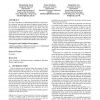2655 search results - page 518 / 531 » An agent model for fault-tolerant systems |
MMAS
2010
Springer
13 years 3 months ago
2010
Springer
The accuracy of atomistic-to-continuum hybrid methods can be guaranteed only for deformations where the lattice configuration is stable for both the atomistic energy and the hybrid...
IROS
2009
IEEE
14 years 3 months ago
2009
IEEE
— Our aim is to explore the fundamental stability issues of a robotic vehicle carrying out localization, mapping, and feedback control in a perturbation-filled environment. Moti...
ATAL
2009
Springer
14 years 3 months ago
2009
Springer
In hedonic games, players have the opportunity to form coalitions, and have preferences over the coalitions they might join. Such games can be used to model a variety of settings ...
ATAL
2009
Springer
14 years 3 months ago
2009
Springer
In a team competition, two participating teams have an equal number of players, and each team orders its players linearly based on their strengths. A mechanism then specifies how...
ATAL
2009
Springer
14 years 3 months ago
2009
Springer
Distributed Constraint Optimization (DCOP) provides a rich framework for modeling multi-agent coordination problems. Existing problem domains for DCOP focus on small (<100 vari...

